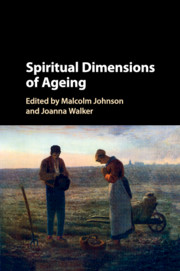Book contents
- Frontmatter
- Contents
- List of Contributors
- Preface
- Acknowledgements
- 1 Spirited Ageing
- Part I The Spiritual Journey of Ageing
- Part II Cultures of the Spirit in Modernity
- 6 Religion, Belief and Spirituality in Old Age: How They Change
- 7 Ritual and Memories of Ritual in Older People's Lives: Contrasts between Eastern and Western Europe
- 8 Religious Ritual and Practice in Old Age
- 9 New Cultures of Ageing: The Impact of the Third Age on Issues of Spirituality and Religion
- Part III Searching for Meaning in Later Life
- Part IV Meeting Spiritual Needs in Older Age
- Index
- References
9 - New Cultures of Ageing: The Impact of the Third Age on Issues of Spirituality and Religion
from Part II - Cultures of the Spirit in Modernity
Published online by Cambridge University Press: 22 December 2016
- Frontmatter
- Contents
- List of Contributors
- Preface
- Acknowledgements
- 1 Spirited Ageing
- Part I The Spiritual Journey of Ageing
- Part II Cultures of the Spirit in Modernity
- 6 Religion, Belief and Spirituality in Old Age: How They Change
- 7 Ritual and Memories of Ritual in Older People's Lives: Contrasts between Eastern and Western Europe
- 8 Religious Ritual and Practice in Old Age
- 9 New Cultures of Ageing: The Impact of the Third Age on Issues of Spirituality and Religion
- Part III Searching for Meaning in Later Life
- Part IV Meeting Spiritual Needs in Older Age
- Index
- References
Summary
Contemporary later life, as viewed in the context of recent social and cultural changes, has taken on the designation of ‘old age problematic’. In particular this perspective argues that the social space that older people now exist in is substantially removed from the worlds of old age that have previously provided the coordinates for organised religion. Utilising the ‘Cultures of Ageing’ approach as a lens to understand the impact of the generationally based culture of the third age on religious and spiritual practices, it argues that many of the assumptions that held together both the ‘natural’ and standardised life course have been transformed by the emphasis on agency, choice and lifestyle which now constitute the desirable objectives of post-work life. Individual participation in the cultural field of the third age can vary considerably as it is dependent on resources and circumstances as well as on predispositions of individuals. However, it is also the case that the generations now entering retirement are marked most fully by their engagement with consumer society and consumer culture.
In preferring to be living in an ‘ageless’ later life rather than experiencing a more ascriptive old age, members of these cohorts have put a distance between themselves and those who they identify as frail, dependent and old. Those who are deemed to be in this category – the fourth age – exist in a feared category of abjection where pity seems to be the only response and a clear distance is kept by those still able to demonstrate independence. This transformation of ageing presents a number of challenges for thinking about religion and spirituality. This paper argues that not only does the third age accentuate an individualised spirituality based upon choice and a rejection of authority, it also projects the more institutionalised practices of mainstream religion as inflexible and dogmatic.
This position is a consequence of the generational habitus of the baby-boomer cohorts whose members find themselves habitually ill-at-ease with notions of hierarchy and tradition. Instead, the emphasis on choice and agency which is a major component of the culture of the third age leads not only to a distancing from the fourth age but also a rejection of the people seen to be in it.
- Type
- Chapter
- Information
- Spiritual Dimensions of Ageing , pp. 141 - 154Publisher: Cambridge University PressPrint publication year: 2016
References
- 3
- Cited by



